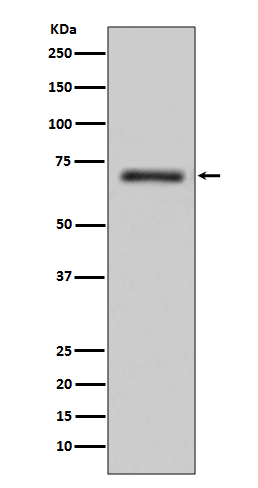

| WB | 咨询技术 | Human,Mouse,Rat |
| IF | 咨询技术 | Human,Mouse,Rat |
| IHC | IHC:1/100-1/200;IHF:1/50-1/200 | Human,Mouse,Rat |
| ICC | 1/50-1/200 | Human,Mouse,Rat |
| FCM | 1/20-1/100 | Human,Mouse,Rat |
| Elisa | 咨询技术 | Human,Mouse,Rat |
| Aliases | FUS; ALS6; CHOP; FUS-CHOP; FUS1; Fused in sarcoma; HnRNPP2; Oncogene TLS; ETM4; Fus-like protein; Oncogene FUS; POMP75;;FUS |
| WB Predicted band size | Calculated MW: 53 kDa ; Observed MW: 70 kDa |
| Host/Isotype | Rabbit IgG |
| Antibody Type | Primary antibody |
| Storage | Store at 4°C short term. Aliquot and store at -20°C long term. Avoid freeze/thaw cycles. |
| Species Reactivity | Human,Mouse,Rat |
| Immunogen | A synthesized peptide derived from human FUS |
| Formulation | Purified antibody in PBS with 0.05% sodium azide,0.05% BSA and 50% glycerol. |
+ +
以下是关于 **FUS/TLS抗体** 的3篇代表性文献摘要:
---
1. **文献名称**: *Ubiquitinated TDP-43 in frontotemporal lobar degeneration and amyotrophic lateral sclerosis*
**作者**: Neumann, M., et al.
**摘要**: 该研究探讨了TDP-43和FUS/TLS蛋白在神经退行性疾病(如ALS和FTLD)中的异常聚集。通过使用特异性抗体进行免疫组化分析,发现FUS/TLS抗体可标记部分病例中的细胞质包涵体,提示其作为病理标志物的潜力。
2. **文献名称**: *Mutations in FUS, an RNA processing protein, cause familial amyotrophic lateral sclerosis type 6*
**作者**: Vance, C., et al.
**摘要**: 研究报道了FUS基因突变与家族性ALS的关联,并开发了针对突变FUS蛋白的抗体。实验显示这些抗体能特异性识别病变神经元中的异常FUS聚集,支持FUS蛋白错误定位在ALS发病机制中的作用。
3. **文献名称**: *FUS-immunoreactive inclusions are a common feature in sporadic and non-SOD1 familial amyotrophic lateral sclerosis*
**作者**: Deng, H.X., et al.
**摘要**: 通过FUS抗体对ALS患者脑组织进行检测,发现散发性及非SOD1突变家族性ALS病例中存在FUS阳性包涵体,表明FUS病理可能广泛参与不同亚型ALS的神经变性过程。
---
这些文献涵盖了FUS/TLS抗体在疾病机制研究、病理诊断及分子标记开发中的应用。如需扩展,可进一步检索涉及FUS抗体在细胞模型或生物标志物筛选中的研究。
FUS (FUsed in Sarcoma), also known as TLS (Translocated in LipoSarcoma), is a multifunctional RNA/DNA-binding protein involved in transcriptional regulation, RNA splicing, transport, and translation. It plays critical roles in maintaining RNA homeostasis and stress granule dynamics. Antibodies targeting FUS/TLS are essential tools in studying its physiological functions and pathological implications.
Mutations in the *FUS* gene are linked to neurodegenerative diseases, notably amyotrophic lateral sclerosis (ALS) and frontotemporal dementia (FTD). These mutations often cause cytoplasmic mislocalization of FUS, leading to toxic aggregates—a hallmark of disease pathology. FUS/TLS antibodies enable researchers to detect these aggregates, analyze subcellular distribution, and investigate disease mechanisms.
In cancer, chromosomal translocations involving *FUS* (e.g., FUS-DDIT3 in myxoid liposarcoma) generate oncogenic fusion proteins. Specific antibodies help identify these fusion products in diagnostic assays and explore their role in tumorigenesis. Additionally, FUS/TLS antibodies are used in techniques like immunoprecipitation, Western blotting, and immunohistochemistry to study protein interactions, post-translational modifications, and tissue-specific expression patterns.
Research using these antibodies has also revealed FUS’s involvement in DNA repair and phase separation processes. Their application continues to advance understanding of FUS-related pathways in both normal cellular function and disease, offering potential biomarkers or therapeutic targets for ALS, FTD, and cancers.
×